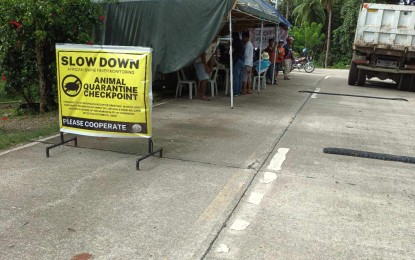
MICROSCOPIC ENEMY. An animal quarantine checkpoint in Odiongan, Romblon on Monday (Jan. 8, 2024). Strict quarantine measures continue to be enforced on live pigs and pork being transported to and from the town as part of state of calamity protocols. (Photo courtesy of Municipal Agriculture Office)
ODIONGAN, Romblon – The municipal government here has completed the distribution of cash assistance to backyard swine raisers whose farms were subjected to compulsory “depopulation” as part of the government’s efforts to arrest the spread of African swine fever (ASF).
In an interview on Tuesday, Municipal Agriculturist Rexfort Famisaran said a total of PHP95,500 was paid in varying amounts to the last 19 pig farmers eligible to receive recompense for the mandatory euthanizing of their livestock.
Since December, the Municipal Agriculture Office (MAO) of Odiongan has paid “ayuda” (financial assistance) to a total of 126 backyard piggery owners after their farms were systematically depopulated.
Famisaran disclosed that the MAO paid PHP500 for every newborn piglet, PHP1,000 for every weanling (one to three-month-old pigs), PHP1,500 for every pig being fattened, PHP2,000 for every sow, PHP2,500 for every breeder, and PHP3,000 for every pregnant sow.
He said that Monday’s payout was conducted at the town hall because of the prevailing tension in ASF-infected barangays, where some pig farmers threatened to harm MAO personnel who took part in the culling.
“They’re asking us to explain why we had to kill pigs that have not shown signs of being infected [by ASF]. We told them that it is government policy that all pigs within a 500-meter radius of an outbreak area have to be put down. They don’t accept this… and become hostile,” Famisaran told the Philippine News Agency.
“According to them, they have grown attached to some of these pigs… especially the breeders and the sows. Sometimes, they hide them in the forests (to escape the culling). Honestly, we are not unsympathetic… we understand that those pigs are their livelihood,” he added.
Meanwhile, Famisaran noted that on top of the cash paid by the municipal government, ASF-hit swine farmers stand to make even more money from the Department of Social Welfare and Development (DSWD) and the Philippine Crop Insurance Corporation (PCIC).
He said DSWD representatives are already making a list of farmers eligible to receive cash assistance, and a payout may materialize as early as February.
Additionally, pig raisers who availed of the free insurance coverage offered by the PCIC will also receive indemnity checks if their animals were included in the culling.
Some 729 backyard hog raisers in this town were reported to have availed of free insurance coverage soon after the ASF outbreak in their town.
Presently, Odiongan town remains in a state of calamity following ASF outbreaks in backyard piggeries across Barangays Progreso Weste, Panique, and Tuburan.
The municipal agriculturist expressed hope that the state of calamity will be lifted in time for the town’s expected elevation to a first-class municipality later this year.
Odiongan has qualified to receive first-class municipality status under Republic Act 11964 or the Automatic Income Classification of Local Government Units Act, which President Ferdinand R. Marcos Jr. recently signed into law.
As a first-class municipality, the town of some 50,000 residents will be eligible for increased administrative and statutory aid, financial grants and other forms of assistance from the national government. (PNA)
